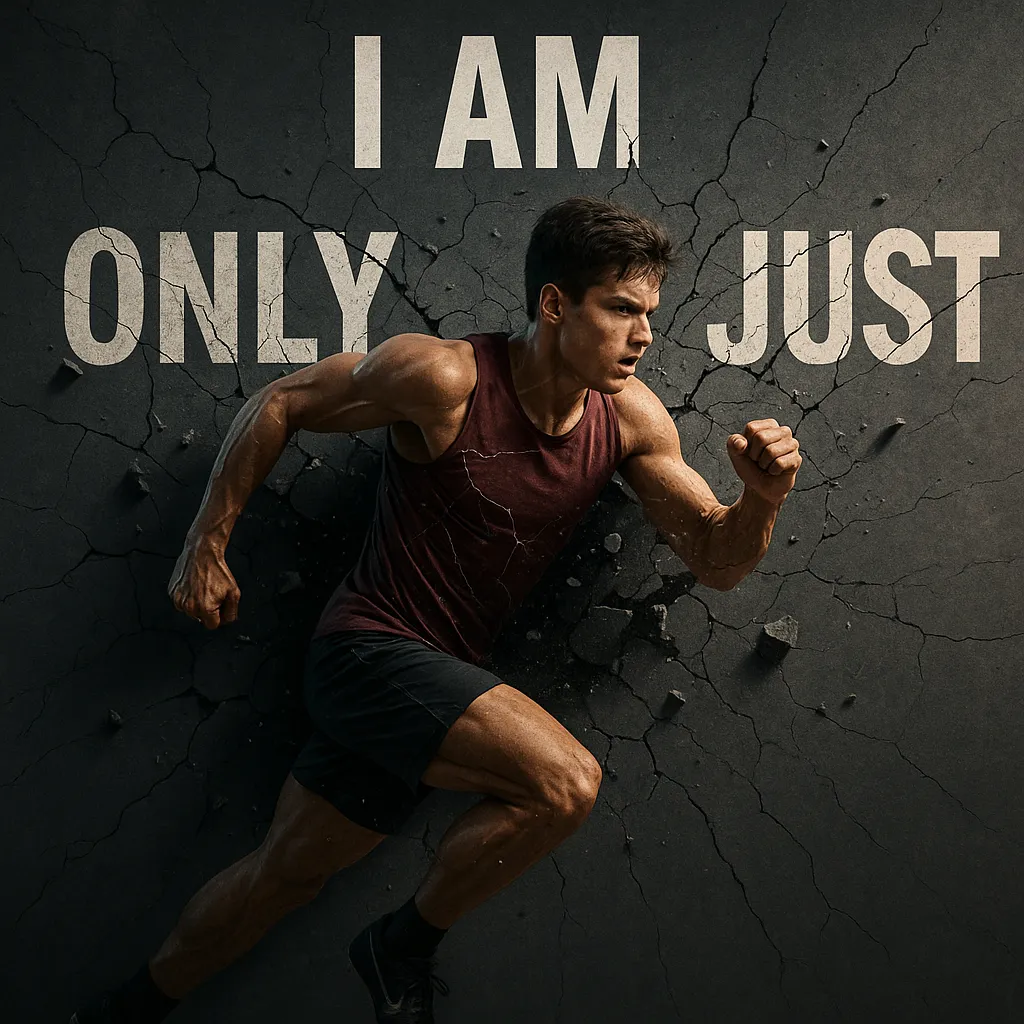
I Am Only or I Am Just…..
I Am Only or I Am Just…..
Every athlete who has walked into a gym, stepped onto a track, or laced up cleats has heard a version of it—“I am only...” or “I am just...” The phrase hangs in the air, sometimes spoken, sometimes buried deep in the mind. It is the voice that says, “I am only a freshman,” “I am just a walk-on,” or “I am only five-foot-eight.” Yet, these words carry far more weight than most realize. In athletics, labeling oneself as “only” or “just” can shape confidence, influence opportunity, and even define the trajectory of an entire sports journey. The real story begins when athletes question what those words truly mean, and what happens when they refuse to let them set their limits.
The Psychology Behind “I Am Only” in Athletics
Self-talk is a powerful driver of athletic performance. When an athlete says, “I am only a backup,” it is not just an observation. It can become a self-imposed ceiling. Sports psychologists have documented how language—especially negative or minimizing phrases—impacts motivation, focus, and resilience. The words used internally often manifest in outward performance, shaping how athletes approach competition, deal with setbacks, and pursue growth.
Research shows that athletes who label themselves as “only” or “just” tend to underestimate their influence on the team and their potential for improvement. This mindset can breed hesitation, which in turn limits risk-taking and creative play. Coaches and mentors frequently point out that shifting this language is a first step toward unlocking new levels of achievement. Acknowledging where one stands is important, but defining oneself by limitations rarely leads to breakthrough moments.
Adopting a growth mindset, as described by experts like Carol Dweck, requires athletes to catch these limiting words early. Replacing “I am just a benchwarmer” with “I am learning every day” can shift the focus from what is lacking to what is possible. This subtle change has measurable effects on effort, persistence, and, ultimately, success on the field or court.
How “Just” Thinking Shapes Athletic Identity
Identity in sports is forged through repetition, feedback, and internal narratives. When athletes constantly refer to themselves as “just” a role player or “only” a late bloomer, they inadvertently narrow their sense of belonging. Athletic identity is not static; it is shaped by both external validation and internal belief. The “just” mindset can keep athletes from seeking leadership roles, volunteering for high-pressure situations, or expressing their ambitions to coaches.
Many former athletes reflect on how their early self-definitions lingered longer than their actual limitations. A player who thought of herself as “just a defensive specialist” might hesitate to take a shot when the opportunity arises, even after her skills have grown. This effect is particularly pronounced in youth and high school sports, where roles can be fluid and potential is still developing. Coaches who recognize this dynamic can intervene, encouraging athletes to see themselves as evolving competitors rather than fixed roles.
Identity is also influenced by peer groups and team culture. When a team collectively values growth and adaptability, the “just” mindset loses its grip. Athletes become more willing to step outside comfort zones, leading to more well-rounded skill development and a stronger sense of purpose.
Breaking Free from Limiting Labels
Every successful athlete has faced moments when self-doubt crept in. The difference between those who progress and those who plateau often comes down to how these moments are handled. Recognizing and challenging limiting labels is a practical skill. Athletes can use reflection exercises, journaling, or conversations with trusted mentors to pinpoint where “only” or “just” thinking has crept into their vocabulary.
Building awareness is the first step. The next is actively reframing self-talk. Instead of “I am only a freshman,” an athlete might affirm, “I am gaining experience every day.” Instead of “I am just a backup,” they might say, “I am ready to contribute when called upon.” These simple shifts are not about ignoring reality, but about refusing to let temporary circumstances define long-term potential.
Bullet points for actionable change:
Track self-talk for a week, noting every time “only” or “just” appears.
Replace limiting phrases with descriptions of progress or effort.
Share new affirmations with teammates or coaches for accountability.
Celebrate small wins to reinforce a growth-oriented identity.
Coaching Strategies to Move Beyond “Just”
Coaches play a pivotal role in shaping how athletes see themselves. Language used in practice, during games, and in feedback sessions can either reinforce or dismantle the “just” mentality. Effective coaches make a habit of highlighting an athlete’s progress, effort, and unique contributions, not just their current status on the depth chart.
Coaching strategies that counteract limiting language include:
Setting individualized goals that focus on skill growth, not just playing time or statistics.
Rotating roles during practice to expose athletes to new challenges.
Publicly recognizing improvement and leadership, regardless of a player’s official position.
Encouraging athletes to reflect on their journey and articulate where they have grown.
When athletes feel seen for more than their current label, they are more likely to engage fully and take calculated risks. This often leads to a more competitive and resilient team culture.
Stories of Athletes Who Refused to Be “Only”
Countless athletes have rewritten their stories by refusing to accept limiting labels. Consider the walk-on who earned a scholarship through relentless effort, or the athlete who began as a role player but emerged as a captain. These stories are not rare exceptions but evidence of what happens when self-definition aligns with ambition rather than limitation.
One powerful example comes from collegiate sports, where walk-ons often face long odds. Many have used their “only” status as motivation, turning it into a badge of honor. Their journeys highlight the importance of perseverance, adaptability, and self-belief. These athletes often inspire their teammates and change the culture of entire programs by showing what is possible when one refuses to let a label dictate their ceiling.
These stories serve as concrete reminders that athletic journeys are rarely linear. Growth often comes from unexpected places, and the willingness to challenge one’s self-perception is a key driver of progress.
The Ripple Effect in Team Culture
When a single athlete breaks out of the “just” mentality, the effects ripple through the entire team. Confidence is contagious. Teammates notice when someone steps up, challenges assumptions, and brings new energy to practice and competition. Over time, this can shift the collective mindset from one of limitation to one of opportunity.
Teams that foster this culture often outperform expectations. They become known for resilience, adaptability, and a refusal to be defined by external rankings or scouting reports. Coaches, parents, and administrators also play a role in promoting or dismantling the “just” mindset, creating an environment where every player feels empowered to grow.
Building this type of culture requires consistent effort and intentional leadership. It thrives on open communication, shared goals, and mutual support. The payoff is a team that not only wins more games, but also develops athletes who are ready to take on challenges beyond sports.
Practical Steps for Athletes Ready to Move Past “Only”
For those ready to shed limiting labels, action is key. The following steps can help athletes make a tangible shift:
Identify one area where “only” or “just” thinking is holding you back.
Set a micro-goal to challenge that belief, such as volunteering for a new drill or speaking up in team meetings.
Seek feedback from coaches and teammates on progress, focusing on effort and improvement.
Document achievements, no matter how small, to build momentum and confidence.
Connect with other athletes who have made similar shifts for support and inspiration.
This approach is not about pretending circumstances are different, but about choosing to define oneself by growth and effort rather than temporary status. The process is ongoing, but every step forward makes the next one easier.
How Parents and Supporters Can Help
Parents, guardians, and supporters have a unique influence on how athletes frame their experiences. The language used at home and on the sidelines often echoes in the minds of young athletes long after the final whistle. Supporters can help by focusing on effort, progress, and character rather than labels or comparison to others.
Effective support includes:
Celebrating growth, not just outcomes.
Refraining from reinforcing limiting labels, even in casual conversation.
Encouraging open dialogue about challenges and setbacks.
Modeling a belief in continuous improvement and resilience.
Supporters who reinforce a growth mindset help athletes build the confidence and grit needed to navigate the ups and downs of sports. Their influence can be the difference between an athlete who says, “I am only,” and one who says, “Watch what I can do next.” For more on supporting athletic journeys, visit Assemble Your Support Team.
When “Just” Becomes the Fuel for Greatness
There are moments when recognizing oneself as “just” or “only” can actually become a powerful motivator. Athletes who embrace their underdog status often channel it into extra effort, sharper focus, and relentless preparation. This fuel can propel them past more heralded competitors who take their roles for granted.
The key is to use these feelings as a launching pad, not a cage. Many top performers credit their early struggles and outsider status as the reason they developed grit and adaptability. The challenge is to harness this energy in a way that drives positive action rather than self-doubt. For more on turning pressure into opportunity, see Pop the Balloon: Do Not Let Pressure Define Your Play.
Final Word: The Power of Redefining “Only”
Every athlete faces a choice about how to tell their own story. The words “I am only” or “I am just” are not the end, but the beginning of a narrative that can be rewritten daily. Those who challenge these labels, who choose to focus on growth and contribution, find themselves on a path that leads far beyond what they once believed possible. Athletic success is rarely about where someone starts. It is about how far they are willing to go, and how bravely they are willing to rewrite their own script.
References:





